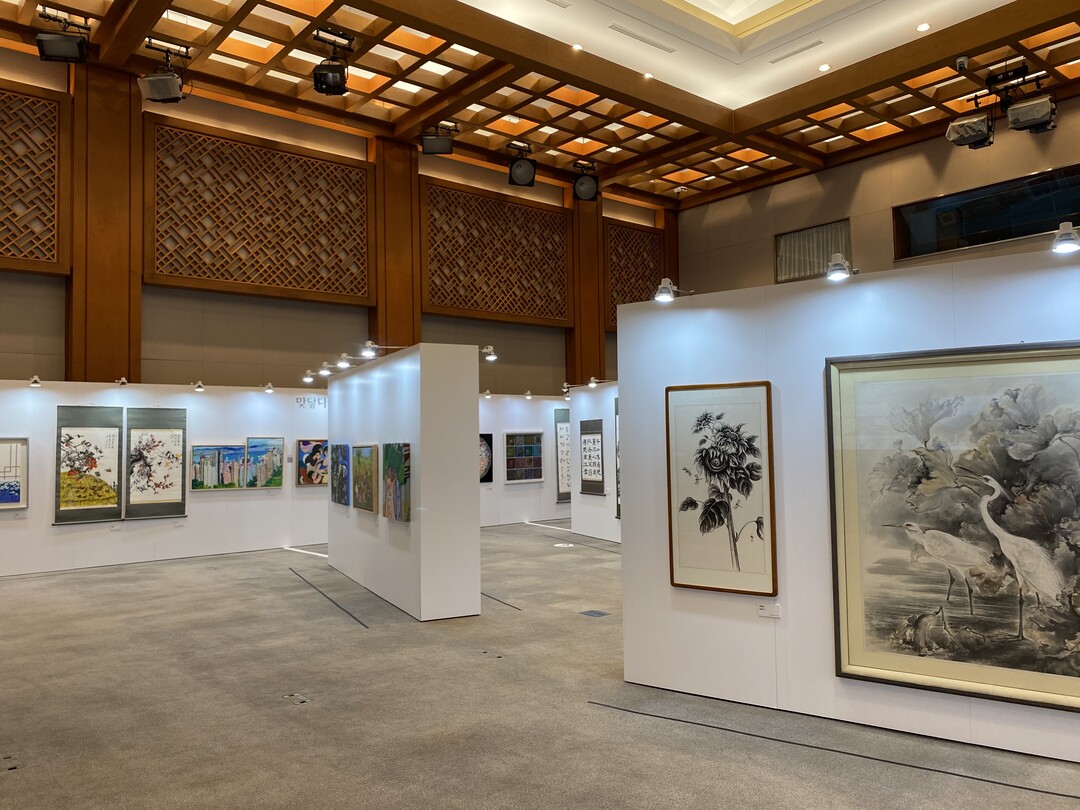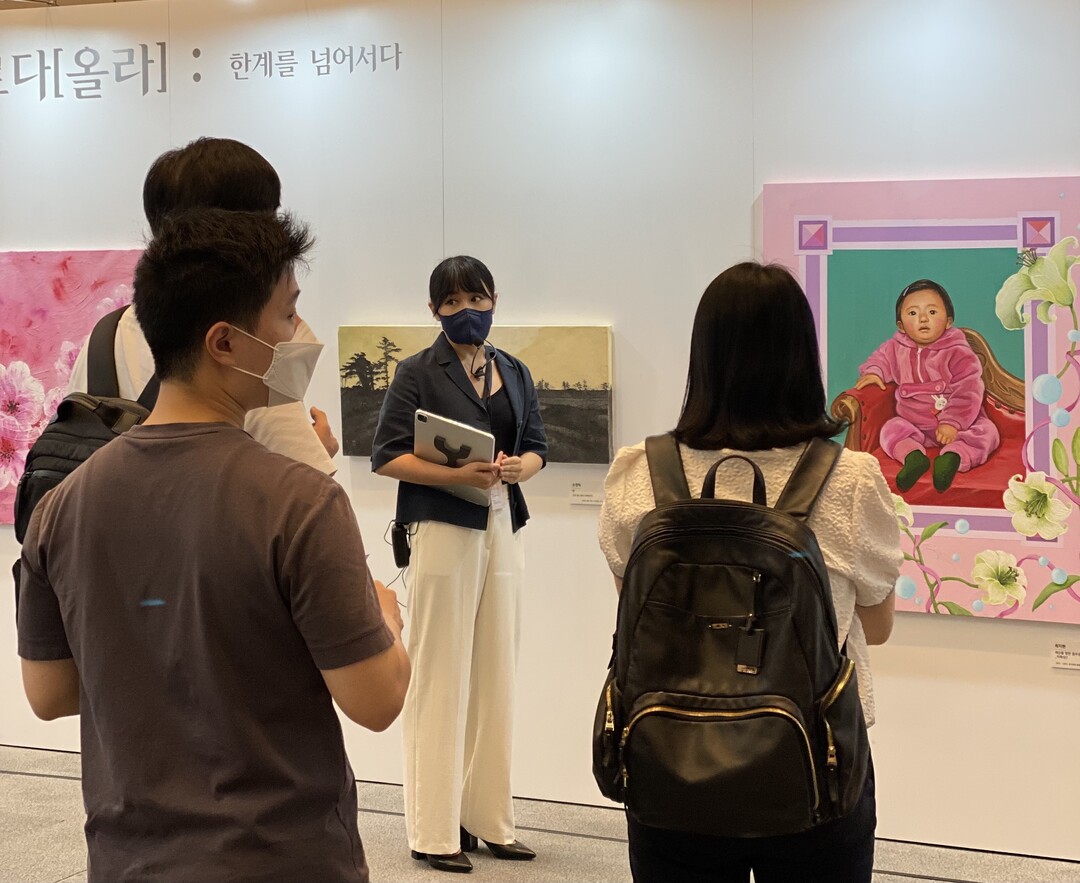The Ministry of Culture, Sports and Tourism (Minister PARK Bo Gyoon, MCST) announced details of its ‘The 1st masterplan for supporting cultural and arts activities of artists with disabilities (2022-2026)’ on September 8 (Thur). This is the first such undertaking by the government of the Republic of Korea.
 |
| ▲ Exhibition 'Into the people and into harmony’, in Chunchugwan in Chengwadae. Photo by Rachel Bae. |
The official initiative is based on Article 6 of the Act on the Support for Cultural and Artistic Activities of Artists with Disabilities. In line with this, the MCST recently took steps to ensure the first art exhibition at Cheongwadae (The Blue House), which would be a special exhibition of disabled artists’ work. (Exhibition title: ‘Into the people and into harmony’, in Chunchugwan in Chengwadae, Aug 31-Sep 19)
MCST’s efforts to draw up the master plan commenced in April 2021, forming a joint sectional committee comprising disabled artists and public and private sector experts. The ministry engaged in consultation with other relevant ministries, departments and municipalities, while also fielding input and opinion from frontline stakeholders and disabled artists, via virtual public hearing sessions. This resulted in a masterplan proposing five strategic initiatives, and ten policy agenda, with the overarching vision of creating a world where disabled artists are fairly respected and can enjoy happy life along with everyone else.
According to research, the average income of disabled artists’ was around KRW 8.09 million, with an average of just KRW 2.18 million earned solely from art work. This is despite 62.2% of those surveyed stating that it is their full-time occupation. Among respondents, 92.4% believe they lack sufficient opportunities to engage in cultural and artistic activities. ‘Expansion of support and in the number of grant recipients for creative work’ was cited most often as an urgent policy requirement to address the issues (70.5%).
[Enhanced creative-field work supports] The ministry will expand art competition projects & grants for art creation, secure barrier-free spaces for artwork (a universial stage that can be a place for all), offer assistance during the entire lifecycle of artistic activity (entry to arts market, etc.)
Responding to the survey results and to add additional scaffolding for disabled artists to comfortably pursue their creative endeavors, the MCST will seek to increase annual grant aid for public art competition projects to KRW 20 billion by 2026 (KRW 6.7 billion in 2022), and widen the net of grant recipients to 2,000 people annually (619 recipients for the first half of 2022).
Furthermore, to make suitable work space more available, the ministry plans to construct a universal stage for artists, along with an exhibition center, barrier-free creation zones and customized residential facilities where they can live and work.
The ministry will pursue art-leasing projects with the work of disabled artists to public institutions, libraries and medical facilities, scale up an on-line platform for the distribution of artwork. Also, will provide support for participation in international disabled artist festivals, including the UK-based “Unlimited”, and foster deeper co-creation and collaboration among disabled artists, domestically and worldwide.
[Broader supports promoting independence]
The ministry will pursue job creation initiatives in municipal government and public institutions, and will facilitate start-ups and employment for artists with disabilities in the private sector.
To achieve these goals, the ministry will build a directory of companies and public institutions offering full-time employment opportunities to the artists to offer more stable jobs to disabled artists.devise grant-aid policies to support them financially for their art projects. Also, the ministry will establish a legal basis permitting companies to employee disabled artists as term-based workers for periods exceeding two years.
Furthermore, incentivize the public sector via financial aid for those founding an art company for disabled artists, and implement special initiatives for artists with severe disability by leveraging the Seoul City and Gyeonggi-do’s public employment program which protects the working rights of people with severe disability.
By codifying standards by specifying the definition and scope of ‘cultural and art activities’, protecting employee rights and recognizing their hours of work.
Further, actively creating wider opportunities for new business start-ups or for securing employment, with the introduction of a new category - ‘enterprise of artists with disability’ in its project supporting art start-ups and rewards them with extra points when they apply for government-sponsored projects.
Also, using secure employment as the stable basis for artists’ independent living with provision of training courses tailored to type of disability or to specific art disciplines, all aligned with trending demand from the private sector.
[Strengthened policy base]
The ministry will expand arts education for people with disabilities, developing a body of professionals skilled in training, planning, production/creation and distribution.
As part of its efforts, the ministry will increase access to education and training via a class voucher scheme for people with disabilities, partner with the ministry of Education to incorporate ‘culture and art’ lessons into special-needs schools and/or assisted classes in general schools, to deepen cultural and artistic engagement among the youth.
Further, nurture a core of professionals who will serve intermediary role for the education and training, planning, creation/production and distribution of the arts, to realize quantitative and qualitative growth for artists in the markets and develop artificial intelligence creation tools, tailored to specific art disciplines and disability type, as part of research and development efforts in cultural technology.
The MCST raised its 2023 budget for ‘Together Nuri Support Project’ by KRW 3.5 billion, for a total investment of KRW26.1 billion.
Sayart.net
Rachel Bae sungmin.b.213@gmail.com
The Ministry of Culture, Sports and Tourism announced details of
‘The 1st masterplan for supporting cultural and arts activities of artists with disabilities
The Ministry of Culture, Sports and Tourism (Minister PARK Bo Gyoon, MCST) announced details of its ‘The 1st masterplan for supporting cultural and arts activities of artists with disabilities (2022-2026)’ on September 8 (Thur). This is the first such undertaking by the government of the Republic of Korea.
 |
| ▲ Exhibition 'Into the people and into harmony’, in Chunchugwan in Chengwadae. Photo by Rachel Bae. |
The official initiative is based on Article 6 of the Act on the Support for Cultural and Artistic Activities of Artists with Disabilities. In line with this, the MCST recently took steps to ensure the first art exhibition at Cheongwadae (The Blue House), which would be a special exhibition of disabled artists’ work. (Exhibition title: ‘Into the people and into harmony’, in Chunchugwan in Chengwadae, Aug 31-Sep 19)
MCST’s efforts to draw up the master plan commenced in April 2021, forming a joint sectional committee comprising disabled artists and public and private sector experts. The ministry engaged in consultation with other relevant ministries, departments and municipalities, while also fielding input and opinion from frontline stakeholders and disabled artists, via virtual public hearing sessions. This resulted in a masterplan proposing five strategic initiatives, and ten policy agenda, with the overarching vision of creating a world where disabled artists are fairly respected and can enjoy happy life along with everyone else.
According to research, the average income of disabled artists’ was around KRW 8.09 million, with an average of just KRW 2.18 million earned solely from art work. This is despite 62.2% of those surveyed stating that it is their full-time occupation. Among respondents, 92.4% believe they lack sufficient opportunities to engage in cultural and artistic activities. ‘Expansion of support and in the number of grant recipients for creative work’ was cited most often as an urgent policy requirement to address the issues (70.5%).
[Enhanced creative-field work supports] The ministry will expand art competition projects & grants for art creation, secure barrier-free spaces for artwork (a universial stage that can be a place for all), offer assistance during the entire lifecycle of artistic activity (entry to arts market, etc.)
Responding to the survey results and to add additional scaffolding for disabled artists to comfortably pursue their creative endeavors, the MCST will seek to increase annual grant aid for public art competition projects to KRW 20 billion by 2026 (KRW 6.7 billion in 2022), and widen the net of grant recipients to 2,000 people annually (619 recipients for the first half of 2022).
Furthermore, to make suitable work space more available, the ministry plans to construct a universal stage for artists, along with an exhibition center, barrier-free creation zones and customized residential facilities where they can live and work.
The ministry will pursue art-leasing projects with the work of disabled artists to public institutions, libraries and medical facilities, scale up an on-line platform for the distribution of artwork. Also, will provide support for participation in international disabled artist festivals, including the UK-based “Unlimited”, and foster deeper co-creation and collaboration among disabled artists, domestically and worldwide.
[Broader supports promoting independence]
The ministry will pursue job creation initiatives in municipal government and public institutions, and will facilitate start-ups and employment for artists with disabilities in the private sector.
To achieve these goals, the ministry will build a directory of companies and public institutions offering full-time employment opportunities to the artists to offer more stable jobs to disabled artists.devise grant-aid policies to support them financially for their art projects. Also, the ministry will establish a legal basis permitting companies to employee disabled artists as term-based workers for periods exceeding two years.
Furthermore, incentivize the public sector via financial aid for those founding an art company for disabled artists, and implement special initiatives for artists with severe disability by leveraging the Seoul City and Gyeonggi-do’s public employment program which protects the working rights of people with severe disability.
By codifying standards by specifying the definition and scope of ‘cultural and art activities’, protecting employee rights and recognizing their hours of work.
Further, actively creating wider opportunities for new business start-ups or for securing employment, with the introduction of a new category - ‘enterprise of artists with disability’ in its project supporting art start-ups and rewards them with extra points when they apply for government-sponsored projects.
Also, using secure employment as the stable basis for artists’ independent living with provision of training courses tailored to type of disability or to specific art disciplines, all aligned with trending demand from the private sector.
[Strengthened policy base]
The ministry will expand arts education for people with disabilities, developing a body of professionals skilled in training, planning, production/creation and distribution.
As part of its efforts, the ministry will increase access to education and training via a class voucher scheme for people with disabilities, partner with the ministry of Education to incorporate ‘culture and art’ lessons into special-needs schools and/or assisted classes in general schools, to deepen cultural and artistic engagement among the youth.
Further, nurture a core of professionals who will serve intermediary role for the education and training, planning, creation/production and distribution of the arts, to realize quantitative and qualitative growth for artists in the markets and develop artificial intelligence creation tools, tailored to specific art disciplines and disability type, as part of research and development efforts in cultural technology.
The MCST raised its 2023 budget for ‘Together Nuri Support Project’ by KRW 3.5 billion, for a total investment of KRW26.1 billion.
Sayart.net
Rachel Bae sungmin.b.213@gmail.com















